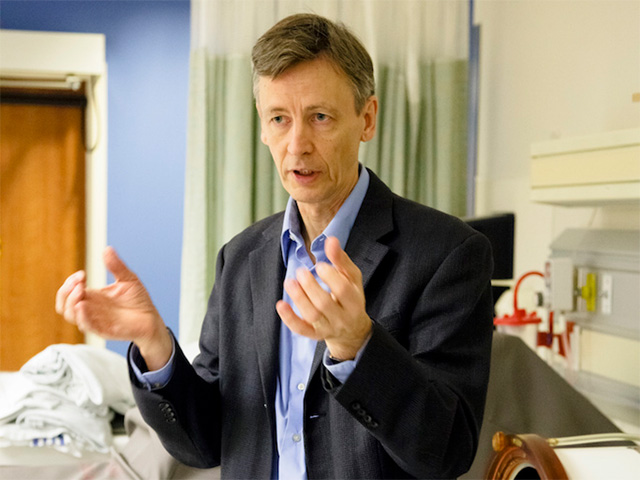Imaging physicist lands renewal of Canada Research Chair
By Alisa Kim
Dr. Kullervo Hynynen, director of physical sciences at Sunnybrook Research Institute (SRI), has secured the renewal of his Tier 1 Canada Research Chair (CRC) in Imaging Systems and Image-Guided Therapy.
The research professorship will provide Hynynen with $1.4 million over seven years. The CRC program is part of a national strategy to help Canadian institutions attract and retain the world's leading researchers.
"I am grateful to the federal government for this investment. It will enable us to get the infrastructure we need to develop technologies to fight brain disorders like Alzheimer's disease and stroke. Getting effective therapies to patients is the reason we do what we do," says Hynynen who is also a professor at the University of Toronto.
The stringent adjudication process involved in the awarding of each CRC-candidates must be nominated by a university and applications are peer-reviewed by global experts from the researcher's field of study-is validation of the quality of the chairholders and their body of work.
Hynynen is a trailblazer in image-guided therapeutic ultrasound. He has developed new technology that uses focused ultrasound in minimally invasive interventions. One of them is focused ultrasound surgery, which uses magnetic resonance imaging (MRI) to guide high-intensity ultrasound in the destruction of tumours and other lesions in the brain and body. The technology enables precise application of the energy produced from sound waves to nuke targeted lesions without damaging surrounding tissue.
In 2010, SRI launched an MR-guided focused ultrasound surgery centre in collaboration with Thunder Bay Regional Research Institute. The suite is part of SRI's $160-million Centre for Research in Image-Guided Therapeutics, a unique-in-Canada facility of which Hynynen is the project lead.
The award will enable him to buy equipment that will further his research into another application of focused ultrasound he has pioneered: using it to disrupt the blood-brain barrier to enable the delivery of drugs or other agents to the brain. This barrier is a protective layer of tightly packed cells that restricts the passage of foreign substances from the bloodstream that may injure the brain. This protective function also blocks the passage of potentially useful therapies.
Hynynen has paired ultrasound and microbubbles (tiny gas bubbles that are injected into the circulation) to open temporarily the blockade to slip drugs and other biological agents into the brain. He has shown that using this technique to deliver antibodies to clear amyloid beta, the sticky, toxic protein that is prominent in Alzheimer's disease, is effective in reducing plaque deposits in the brains of mice with the disease.
"The therapeutic potential is huge," says Hynynen of the disruptive technology. "It opens up treatment options by allowing the use of medicines that previously could not be used in the brain."
To assess the impact of treatment on the brain, Hynynen will use a memory testing system to study changes in behaviour. He will also use MRI-compatible electrophysiology equipment and a powerful automated microscopy system to look at changes in brain function and structure.
Remedies for brain-ravaging diseases like dementia cannot come soon enough. The number of Canadians with dementia is expected to mushroom to one million within 25 years.
"I congratulate Dr. Hynynen on the renewal of his research chair," says Dr. Michael Julius, vice-president of research at SRI. "He's doing game-changing work, and this award recognizes that."
Nine other SRI scientists hold Canada Research Chairs.






